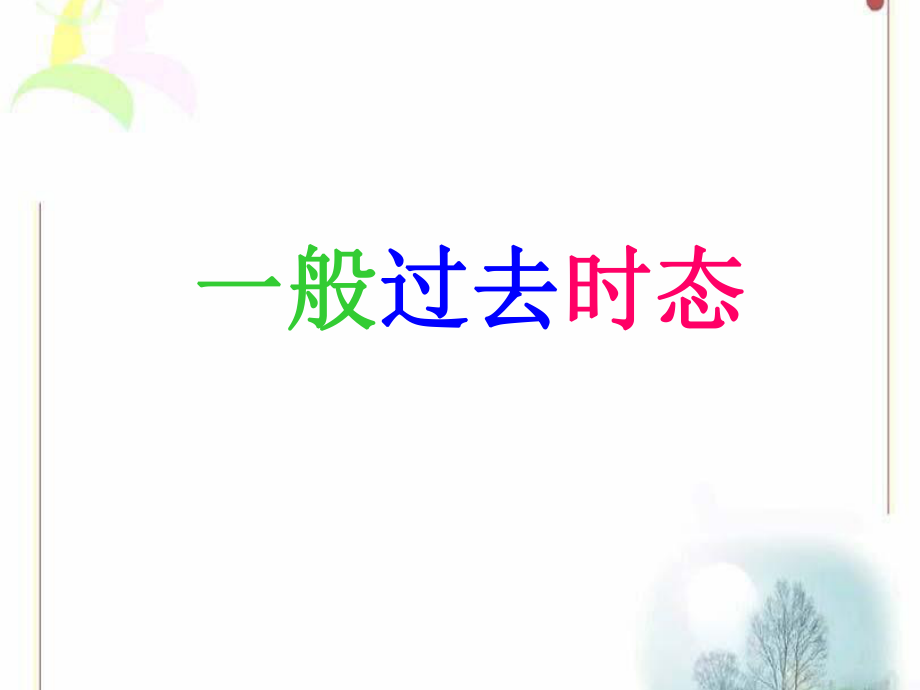《仁愛版英語 七下 unit7 Topic 3語法課件一般過去時態(tài)(共30張PPT) .ppt》由會員分享�,可在線閱讀,更多相關(guān)《仁愛版英語 七下 unit7 Topic 3語法課件一般過去時態(tài)(共30張PPT) .ppt(30頁珍藏版)》請在裝配圖網(wǎng)上搜索�。
1、一般一般過去過去時態(tài)時態(tài)什么是一般過去時�����?什么是一般過去時����?動詞的一般過去時態(tài)表示動詞的一般過去時態(tài)表示過去發(fā)生的過去發(fā)生的動作、情況或存在的狀態(tài)動作、情況或存在的狀態(tài)��。行為動詞行為動詞( (即實義動詞即實義動詞) )的的過去式?jīng)]有過去式?jīng)]有人稱人稱和數(shù)的變化和數(shù)的變化�����。所有時態(tài)都是通過所有時態(tài)都是通過動詞動詞變化來表現(xiàn)的變化來表現(xiàn)的I _ 12 years old this year. 我去年我去年11歲歲.I _ 11 years old last year.He _ in Beijing now.他昨天在上海����。他昨天在上海。He _ in Shanghai yesterday.他現(xiàn)在在北
2���、京���。他現(xiàn)在在北京。Please look at the sentences我今年我今年12歲歲.amwasiswasThey _ in China today.他們今天在中國��。他們今天在中國���。They _ in Japan yesterday.他們昨天在日本他們昨天在日本���。areweream/ iswasarewere每天,早餐我吃雞蛋和牛奶��。每天,早餐我吃雞蛋和牛奶�����。I _ eggs and milk for breakfast every morning.昨天��,早餐我吃面條���。昨天,早餐我吃面條����。I _ noodles for breakfast yesterday morning.他每天都
3、吃水果���。他每天都吃水果��。He _ fruit every day.昨天他吃了昨天他吃了3個蘋果�。個蘋果�。He _ 3 apples yesterday.have/ hashadhavehashadhadI get up at 6:30 every morning.I _ up at 9:00 last Sunday.He plays football every afternoon.He _ basketball yesterday afternoon.He does his homework every evening.He _ some reading last night.動詞原形、第三
4����、人稱單數(shù)動詞原形���、第三人稱單數(shù)動詞過去式動詞過去式gotplayeddidThey dont watch TV in the evening.They _ TV last night.She doesnt play basketball after school.She _ basketball after school yesterday.Do you go to school on foot every day?_ you _ to school on foot yesterday.Does he go to school by bus every day?_ he _to school
5、by bus yesterday?dont/ doesntdo/ doesdidntdiddidnt watchdidnt playDidDidgogo謂語構(gòu)成謂語構(gòu)成1.動詞動詞 be2.動詞動詞 have, has3.助動詞助動詞do, does4.行為動詞用過去式行為動詞用過去式was , werehaddid一般過去時以動詞的過去式來表示���,一般過去時以動詞的過去式來表示�����,沒有人稱和數(shù)的變化沒有人稱和數(shù)的變化.(was,were除外除外)I went to school yesterday.They went to school yesterday.一般過去時的謂語構(gòu)成:由動詞一般過去時
6�、的謂語構(gòu)成:由動詞的過去式構(gòu)成(參看書本)的過去式構(gòu)成(參看書本)規(guī)則變化規(guī)則變化1.一般加一般加ed2.以以e結(jié)尾加結(jié)尾加d3.末尾只有一個輔音字母的重讀閉末尾只有一個輔音字母的重讀閉音節(jié)詞���,先音節(jié)詞����,先雙寫雙寫這個輔音字母�,再這個輔音字母,再加加ed .work workedchange changedprefer preferredstop stopped4.以輔音字母加以輔音字母加y 結(jié)尾的詞結(jié)尾的詞,先改先改 y為為 i,再加再加edstudy studied規(guī)則動詞過去式規(guī)則動詞過去式-ed的發(fā)音的發(fā)音1.在以在以清輔音清輔音結(jié)尾的規(guī)則動詞后結(jié)尾的規(guī)則動詞后, -ed讀作讀作/ t
7�、 /work/w3:k/edt/2.在以在以濁輔音或原音濁輔音或原音結(jié)尾的規(guī)則動詞后結(jié)尾的規(guī)則動詞后, -ed讀作讀作/d /play/pleI / live/lIv /edd/edd/3.在以在以/t/或或/d/結(jié)尾的規(guī)則動詞后結(jié)尾的規(guī)則動詞后, -ed讀作讀作/Id / visit/vIzIt /edId/finished enjoyedshoutedmoved helped wantedcalled needed /t/d/Id/d/d/t/Id/Id/1.在過去某一時間內(nèi)發(fā)生的動作:在過去某一時間內(nèi)發(fā)生的動作:He home at ten oclock last night.2.表示過
8、去經(jīng)?�;蚍磸?fù)發(fā)生的動作表示過去經(jīng)?����;蚍磸?fù)發(fā)生的動作,常常與與often,always等表示頻度的等表示頻度的 間狀語連用:間狀語連用:I often very early at that time.3.表示已故人所做的事情����。表示已故人所做的事情。Comrade Lei Feng good deeds in his life. 雷鋒同志做了一生的好事����。雷鋒同志做了一生的好事。4. 表示過去所發(fā)生的一系列的動作表示過去所發(fā)生的一系列的動作,而這而這一系列的動作是從現(xiàn)在的角度來考慮的一系列的動作是從現(xiàn)在的角度來考慮的,不是從動作相互之間的關(guān)系這一角度來不是從動作相互之間的關(guān)系這一角度來考慮的����?����?紤]的
9����、。Miss Liu got up at seven oclock this morning, dressed, had breakfast, and went to work.1.與與ago 連用:連用:a momenttwo minutesthree hoursfive daysone weeksix monthsfour yearsago用于一般過去時的時間狀語用于一般過去時的時間狀語lasttimenightweekmonthtermMondayyesterdaymorningafternooneveningthe day before yesterday 2.與與last 連用連用3.
10�����、與與yesterday 連用:連用:4.與與one 連用:連用:onemorningevening dayMonday afternoon5.與與that 連用:連用:thatmorningwinterdayyearjust nowin the old daysin those daysin 1980the other dayat that timeonce upon a time6.其他時間狀語:其他時間狀語:行為動詞一般過去時的否定式行為動詞一般過去時的否定式一般過去時的否定式是在動詞原形一般過去時的否定式是在動詞原形前加助動詞前加助動詞did not (didnt).主語主語+didnt
11�����、+動詞原形動詞原形I _ them the news.I _ (tell) them the news yesterday.didnt telltold行為動詞一般過去時的疑問式行為動詞一般過去時的疑問式一般過去時的一般疑問式在句一般過去時的一般疑問式在句首加助動詞首加助動詞didDid+主語主語+動詞原形動詞原形?They _(finish) their work at four.一般疑問句一般疑問句:_ they _ their work at four?Yes, they _. No, they _.finishedDidfinishdiddidnt一般過去時的特殊疑問式一般過去時的特殊
12����、疑問式They finished their work at four.ABWhat did they do at four?When did they finish their work?T注意注意1.外加助動詞外加助動詞did后后,動詞須返回原形。動詞須返回原形���。Did he went to school yesterday?Did he go to school yesterday?F2.簡略回答用助動詞簡略回答用助動詞did/didnt代替代替行為動詞���。行為動詞。Did he find the boy yesterday?Yes, he did.No, he did not (didn
13�����、t).1. look2. live3. stop 4. go5. hope6. trip 7. call 8. eat 9. want 10. are 11. go 12. have13. do 14.get 15. come16. say 17.see 18. put19. read20.take lookedlivedstoppedwenthopedtrippedcalledatewantedwerewenthasdidgotcamesaidsawputreadtook21.buy 22.sing 23.hear24.make25. find 26.break 27.think 28.fa
14�����、ll 29.write30.beboughtmadefoundbrokethoughtfellwrotewas/weresangheardExercises 1.I _ the number down on a piece of paper a moment ago. A. write B. writed C. wrote D. writing2. Everything _ ready before Father came. A. were B. was C. is D. areCB3.He always _me last term. A. helped B. helps C. helping
15��、 D. help 1._ you _ (remember) to buy the oranges?2.Who _ (invent) the computer.3.We _ (go) to the cinema last night. The film _ (be) very good.4.What time _ you _ (get) to school this morning?5.Jim _ (do) a lot yesterday. He _ (go) shopping and _ (cook) supper. Did remember invented wentwas did getd
16�、idwent cooked 6. He usually _ (get) up at 6 in the morning. Look! He _ (get) up now. But yesterday he _ (get) up very late, so he _ (go) to school late. He _ (be) late for school.getsis gettinggotwentwas1.Lucy did her homework at home. (改否定句改否定句) Lucy _ _ her homework at home.2.He found some meat in the fridge. (變一般疑問句變一般疑問句) _ he _ _ meat in the fridge?3.She stayed there for a week. (對劃線部分提問對劃線部分提問) _ _ _ she _ there?4.There was some orange in the cup. (變一般疑問句變一般疑問句) _ there _ orange in the cup? didnt doDid find any How long didstayWas any
 仁愛版英語 七下 unit7 Topic 3語法課件一般過去時態(tài)(共30張PPT) .ppt
仁愛版英語 七下 unit7 Topic 3語法課件一般過去時態(tài)(共30張PPT) .ppt

